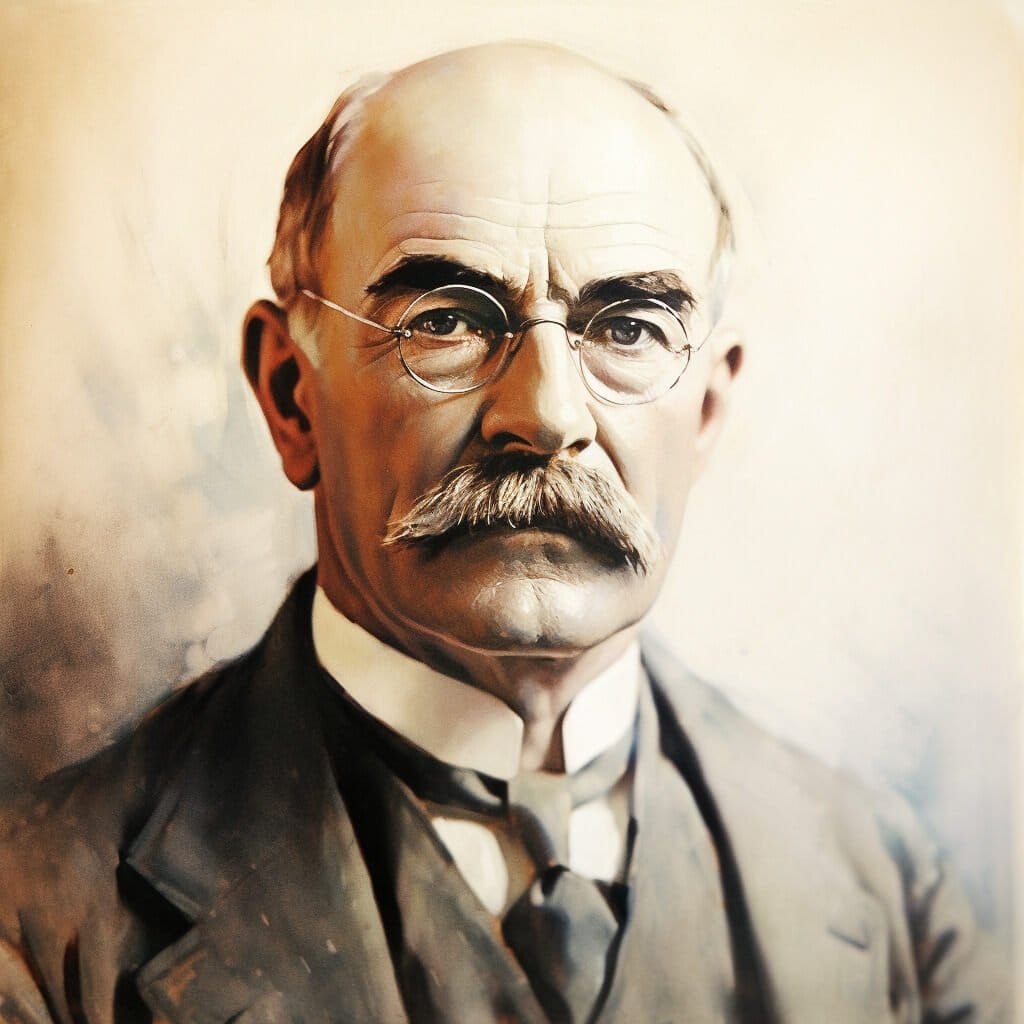Rudyard Kipling was an incredibly popular writer during his lifetime and for the years following his death. He was known as a poet, story writer, and novelist. But, his reputation has suffered over recent decades due to readers’ perception of him as a thoughtless imperialist. Today, although some of Rudyard Kipling’s poems and stories are contentious, many readers still enjoy his most famous works, such as ‘Gunga Din,’ ‘Mandalay,’ and The Jungle Book.
The prodigiously gifted writer was a man of many talents and had a broad literary repertoire. He left a legacy of rich, complex, and technically well-executed work, creating stories and poems for both the young and old.
Life Facts
- Rudyard Kipling was born in Bombay, India, in December 1865.
- In 1886, Kipling published his first collection titled “Departmental Ditties.”
- In the early 1900s, the Kiplings bought an estate in Sussex known as Bateman’s.
- Kipling’s son John died in France in 1915.
- He developed an ulcer that eventually led him to take his own life in January 1936.
Interesting Facts
- ‘Wee Willie Winkie‘ and ‘American Notes‘ were published in the late 1880s and early 1890s.
- Kipling’s best-known book is ‘The Jungle Book.’
- After marrying, Kipling and his wife traveled to Canada and Japan.
- Over the last two decades of his life, he stopped writing literature for children and suffered from health issues.
- His ashes are interred at Westminster Abbey in Poet’s Corner.
Famous Poems
- ‘The Gods of Copybook Headings‘ discusses, through the metaphor of a copybook, the malevolent nature of progress and humanity’s eventual return to the basic principles of a good life. Kipling depicts the copybook headings as proven moral points. These are beliefs that humanity returns to again and again. Even when people drift away from the copybook headings, they’re still close to one’s minds. The headings reassert themselves, and the cycle begins again.
- ‘Gunga Din‘ is told from the perceptive of an English soldier in India. The soldier describes Gunga Din, a water carrier who saves the soldier’s life in battle. Despite his hard work and kindness, Gunga Din is treated terribly by the Englishmen he serves with. He dies after saving the speaker’s life. The soldier concludes that Gunga Din was a far better man than he was.
- ‘If ‘ is, without a doubt, Kipling’s most famous poem. It is filled with advice from a father to his son about how to live his life. The “then” portion complements the “If” portion of the poem. A solution follows every scenario. If a reader does, as the speaker has suggested, he declares that they will be set to conquer the world and become a “Man.”
- ‘The Glory of the Garden‘ is about English gardens and the need to create a perfect space. The poem extolls hard work over laziness and expands the “garden” to include all of England. Throughout, the poet makes sure to emphasize all the hard work that goes into it. This is seen through the “tool-and-potting sheds” and “barrows and the planks.”
- ‘The Ballad of East and West’ speaks about the life of an Afghan warrior and raider, Kamal. In particular, a series of events in which he takes a horse from an English colonel. The complex story includes various perspectives as the Colonel’s son seeks out Kamal. Kamal tries to reason with the son, telling him that he should not risk his life over a horse. Eventually, the horse returns to the owner of its own accord, and the Colonel’s son gives Kamal a pistol.
Explore more of Rudyard Kipling’s poems here.
Early Life
Rudyard Kipling was born in Bombay, India, in December 1865. His parents were Alice Macdonald and John Lockwood Kipling. His father worked as an artist and Principal and Professor of Architectural Sculpture at Sir Jamsetjee Jeejebhoy School of Art in Bombay.
The couple had moved to India in 1865 after marrying in Staffordshire, England. As a child, Kipling was close to his mother and his younger sister, Alice. The siblings would spend time exploring the markets of Bombay and were exposed to various cultures and ways of life. When he was six years old, he was sent to England to receive a proper education. He lived with a foster family in a boarding house in Southsea. The matriarch, a widow of an old Navy captain, was a brutal and cruel woman. She was unkind to the young boy and often beat him.
After enduring the punishing time in Southsea, Kipling went on the attend the United Services College in Westward Ho, Bideford.
During this difficult period of his life, he found temporary relief in the books he came into contact with. These included the poems of Ralph Waldo Emerson and Wilkie Collins. At eleven years old, due to his living conditions, he was on the verge of a nervous breakdown. His mother was informed, and she removed him from the household and placed him in a school in Devon. It was there that he first discovered his writing talent. He would eventually find work with the school newspaper.
It was in 1882 that Kipling returned to India. He was deeply moved by this change in his circumstances and made his home in Lahore. Kipling worked for a local newspaper while spending his free time exploring the city. In 1886, Kipling published his first collection titled Departmental Ditties and began contributing short stories to the Civil and Military Gazette.
In 1892, Kipling got married to Caroline Balestier, who was the sister of Wolcott Balestier. Wolcott was an established American publisher, a connection that undoubtedly helped Kipling during his career. Wolcott and Rudyard were within the same literary circles and had even come together to collaborate in 1892 with the work The Naulahka.
Early Works
Throughout the later months of 1886 and the early months of 1887, around thirty-nine stories appeared in the newspaper. A number of these were compiled in Plain Tales from the Hills in 1888. It was his first prose collection and was published when he was 22. Over the next year, he journeyed back to England with the hopes of working off the successes of his previous publications.
Literary Career
His next collections, Wee Willie Winkie and American Notes, were published in the late 1880s and early 1890s. These volumes were inspired by the time he spent in America alongside Wolcott Balestier. It was in 1891 that Kipling grew close with Balestier’s sister, Carrie. The two married soon after Balestier’s death from typhoid fever.
After marrying, Kipling and his wife traveled to Canada and Japan. It was during these years that Kipling lost his entire fortune due to the failure of his bank. The young couple moved to Brattleboro and settled down in a small, economical cottage. It was here that they had their first child, Josephine. She was followed by Elsie and, later, John, born in 1897 after the couple moved to Devon.
Rudyard Kipling became the first Englishman to win a Nobel Prize. In 1907 he received the Nobel Prize for Literature, arguably one of the greatest accolades a poet can achieve.
Literary Successes and Personal Tragedies
It was also around this time period that Kipling published his best-known work, The Jungle Book. This novel, along with its sequel, was produced alongside several volumes of poetry and another collection of short stories in a four-year period. The works, The Jungle Book and The Second Jungle Book, were extremely popular with children, which deeply pleased Kipling.
In 1899, after a disastrous journey back to the United States for a visit with Carrie’s parents, their daughter Josephine died of pneumonia. Kipling had contracted the illness and was spared from the news of her death until he had recovered. He was never the same again.
In the following years, Kipling published the popular novel Kim, and the Kiplings could buy an estate in Sussex known as Bateman’s. In the same year, the Kiplings purchased the estate where Rudyard published Just So Stories, another work received well by the public.
Later Life and Death
Rudyard Kipling grew into a role as a journalist, becoming an active war correspondent in South Africa during the Boer War. After some great success, he was called up to become the ‘Honorary Literary Advisor’ for the Imperial War Graves Commission. In the early years of the first world war, Kipling traveled to France to report on activity from the trenches. He also helped his son John in his quest to enlist in the army. He had been turned down several times due to problems with his eyesight. John Kipling eventually became a member of the Irish Guard and went missing in October 1915. Kipling searched for his son in France but never recovered his body.
The death of a second child proved to be the beginning of a darker period of time for Kipling. Over the last two decades of his life, he stopped writing literature for children and suffered from health issues. He had developed an ulcer, which eventually caused him to take his own life in January 1936. He had died at his home in Burwash, East Sussex, where he had spent the rest of his life since 1902. Kipling’s works of inarguable greatness propelled him to the heights of literary fame, and he was recognized upon his death for his contributions. His ashes were buried at Westminster Abbey, London, in Poet’s Corner, alongside all-time great poets such as; Geoffrey Chaucer, William Shakespeare, and Ted Hughes.
There has been some controversy surrounding Kipling’s life and his political and social views leading up to and after his death. It is believed that some of Rudyard Kiplin’s poems were imperialist in nature, supporting and even encouraging colonialism. His poem ‘The White Man’s Burden: The United States and The Phillippine Islands‘ is said to be the most glaring example of his positive outlook on nations spreading their power throughout the world. In this particular poem, he is suggesting that the United States should follow in the footsteps of the British Empire and engage in expanding its domain.
Influence from Other Writers
Rudyard Kipling was notably influenced by writers such as Robert Armitage Sterndale, Robert Louis Stevenson, and H. Rider Haggard.
FAQs
In 1907, Rudyard Kipling was awarded the Nobel Prize for Literature, the youngest yet to become the Nobel Prize Literature Laureate. It is said that his creativity, imagination, and his ability to create such incredible characters in his verses were the reasons for his win.
Rudyard Kipling had a unique upbringing and childhood. He was born in India and stayed there until the age of six when he and his sister Beatrice were sent to Britain to begin their education.
Rudyard Kipling was known for his fabulous use of words. One quote that stands out is, “Words are, of course, the most powerful drug used by mankind,” which perfectly summarises the power of language.
Rudyard Kipling is arguably one of the most influential British poets of all time, known for his colonial-era works. Most famously, he wrote The Jungle Book, an iconic collection of stories and poems about animals. Kipling was equally adept at exploring themes of war, empire, and patriotism.
Although Rudyard Kipling is known for a variety of poetic forms, including ballads, hymns, and narrative poems, many of the same motifs run through his works. Kipling’s poetry is characterized by its vivid imagery and strong narrative voice, as well as its engagement with complex themes related to identity, power, and social hierarchy.


